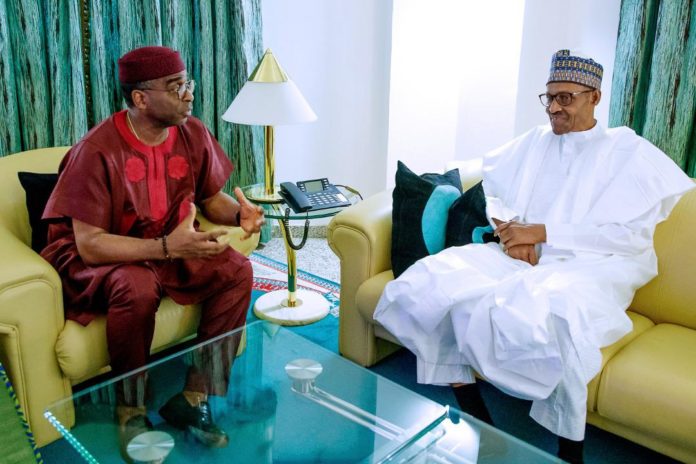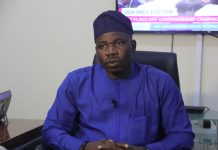…says it is the panacea for sustainable economic growth
President Muhammadu Buhari has expressed his satisfaction at the achievements so far made at the Nigerian Export Promotion Council ( NEPC) saying ” it is the panacea for sustainable economic growth.
He made the remarks after the Director/ CEO of NEPC Mr Olusegun Awolowo briefed him on the impact of the Zero Oil Plan (ZOP) in revitalising the country’s
With dwindling oil revenue, the quest to reposition the nation’s revenue base through the non-oil export sector is a policy the present administration is vigorously pursuing.
The ZOP was developed as part of strategic effort to address the economic recession, following the crash in oil revenue which saw the country’s oil revenue plunge from $70 billion in 2014 to $40 billion in 2015.

Mr. Awolowo while speaking with State House Correspondents said the ZOP which today was a core component of the Economic Recovery and Growth Plan (ERGP) “is targeted at adding an extra US$150billion (minimum) to Nigeria’s foreign reserves cumulatively from non-oil exports over the next 10 years, creating at least 500,000 additional jobs annually – with an increase in productive and export activities as well as lifting at least 20 million Nigerians out of poverty.
The ERGP, he said had earmarked economic diversification as the country’s regrowth lever and incorporates the Zero Oil initiative as a strategy for boosting foreign exchange through the non-oil sector.
“The plan has rolled out export policies to promote 22 major products that would generate up to US$30Billion in foreign exchange including cotton, rice, leather, gold, soya, sugar, cocoa, petrochemicals, fertilizer, palm oil, rubber, cement, tomato, banana, oranges, cashew, cassava, sesame, spices, ginger, shea butter and cowpea – where Nigeria has comparative advantage in production. Export projects have commenced on this and investment tracking is ongoing in each State as part of the One State One Product scheme – meant to scale up production for exports.” He said.
According to Awolowo “For years, crude oil had served as the primary export earner for Nigeria, accounting for over 90 percent of foreign exchange earnings and more than 65 percent of Federal budget funding. The crash in oil prices in 2015, revealed significant fault lines in Nigeria’s mono product economy, which resulted in a chain reaction of negative economic trends, including falling foreign exchange reserves, pressure on the local currency, higher inflation, lower economic growth, and lower foreign investment that eventually culminated in an economic recession”.
On the National Committee on Export Promotion (NCEP), he disclosed that with inauguration of the Committee in September 2017 by His Excellency, Vice President Yemi Osinbajo, GCON, the Committee chaired by the Jigawa State Governor, His Excellency Muhammad Badaru Abubakar, drives the implementation of the Zero Oil plan through the following strategic programmes:
• Establishment of an Export Trading Company of Nigeria with a public-private partnership initiative.
• Establishment of domestic export warehouses/aggregation centres for exportable products
• Launching of an Anchor Borrower Programme for Exporters to support major off-takers from MSMEs for export.
Mr. Awolowo said that now was the time to intensify the diversification agenda of Mr. President given that Nigeria’s largest buyers of crude oil had announced their intentions to reduce future demand.
For instance, he said, India, China, European countries, amongst others had set goals within the next 10-20 years to cut their crude oil consumption by at least by 50%. While other oil-producing countries like Nigeria have also announced their own plans to diversify their exports revenues away from crude oil – Saudi Arabia’s has announced a ‘Saudi 2030’ plan; Russia has announced a major 6-year plan backed by decrees; Angola has also commenced a diversification plan.
On the achievements of the ZOP since it was initiated in 2017, Awolowo enumerated these to include among others:
• Non-oil exports (excluding natural gas) rising from US$1.17 billion in 2016 to US$3.16 billion in 2018. This is an increase of 170% (source: International Trade Centre)
• Strategic sectors identified in the Zero Oil plan have seen growth. Cocoa exports have risen by $79.4million since 2017, while sesame exports have increased by $153 million since 2016 – an increase of more than 100% (source: International Trade Centre)
• The plan has mobilized US$5 billion in investments into export orientated sectors, a lot of which has gone into the fertilizer, petrochemicals, leather, and sesame sectors for exports
The plan has developed an upcoming pipeline of new investments worth an additional US$7.5 billion, for new non-oil projects aimed at exports as well as mapped out 5 million jobs today, directly supported by non-oil exports, with efforts underway to increase this by 500,000 new jobs a year on full implementation
The Central Bank of Nigeria has approved the commencement of an Export Facilitation Initiative focusing on five commodities identified as priorities in the Zero Oil plan: cashew, cocoa, palm oil, sesame and shea.
He disclosed that it was against this background that the Council won the International Trade Centre’s 2018 World Trade Promotion Organization award for “Best initiative to ensure that trade is inclusive and sustainable” judged based on our Zero-to-Export Capacity building programme.
He commended the President commitment in paying the backlog of the Export Expansion Grant (EEG) noting that the release of funds by this Administration has given substantial confidence to the business community on the sincerity and commitment of Government to its policy of diversifying the economy.
“This Promissory Note Programme has contributed massively to the upward trend in non-oil exports since 2016 (us$1.17Billion) to US$3.16 Billion in 2018”, he added.
It could be recalled that the present government of President Muhammadu Buhari GCFR came on board no stone have been left unturned in the quest to grow and diversify the country’s economy through non-oil exports.
In March 2018, government empowered the Central Bank of Nigeria (CBN) with N500 billion facility through the Non-Oil Export Stimulation Facility (NESF) to engender growth in the non-oil sector and increase foreign reserves accretion. The scheme was created to help redress the declining export-financing and reposition the sector to increase its contribution to development.
NESF came on the heels of the Anchor Borrowers scheme which was launched by Mr. President on November 17, 2015, with the broad objective to create economic linkages between smallholder farmers and reputable large-scale processors thereby increasing agricultural output and significantly improving capacity utilization of processors, creating jobs and reducing poverty.










